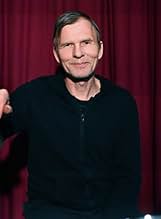VALUTAZIONE IMDb
5,7/10
5550
LA TUA VALUTAZIONE
Un giovane scrittore rimane incuriosito da una misteriosa donna dai capelli scuri che afferma di essere sua sorella perduta da tempo.Un giovane scrittore rimane incuriosito da una misteriosa donna dai capelli scuri che afferma di essere sua sorella perduta da tempo.Un giovane scrittore rimane incuriosito da una misteriosa donna dai capelli scuri che afferma di essere sua sorella perduta da tempo.
- Regia
- Sceneggiatura
- Star
- Premi
- 2 vittorie e 2 candidature totali
Recensioni in evidenza
I watched Pola X because Scott Walker composed the film score and I admire his music a lot. Frankly, I expected a somewhat pretentious and possibly incoherent French movie. I was wrong. The vision of the film quickly managed to engage my attention to the fullest - starting with the opening sequence, which shows black and white footage of military airplanes throwing bombs at graves at the sounds of music and Scott Walker's beautiful wailing voice. The film explores the identity crisis of Pierre (Guillaume Depardieu - a brilliant choice for the role) and his consequential (self-)destruction. The story is divided into two parts the first depicts Pierre's carefree life in a beautiful house in the French countryside and the second follows his utter personal disintegration after he abandons everything and moves to Paris to live in squalor with his supposed half-sister. Both parts contain some amazingly stunning photography the first very colorful and bright, the second utterly gloomy and nearly apocalyptic - adding up to a true aesthetic feast. Pola X is a fascinating and quite unique movie experience.
As the previous commentator said, Leos Carax's style did change, although I do not know why. I wouldn't say he has become a German romantic, because I still think Pierre, the protagonist is a man searching for an aesthetic truth within a self-destructing world. He is a newly disillusioned man, who goes through a psychological adventure bitter at the hypocrisy of his old life, striving to strike and lash at the world with the bitter truth he has acquired. Although one could see this as a clear-cut razor sharp character, I find I cannot help but see him as a poet-like figure, in a Paris as stark as it really is, but this isn't new because his depiction of Paris in his last film was far from idealistic..
I had just returned from France and was craving a French film to take the edge off the end of a vacation. However, Pola X was the most disjointed and pretentious film I've seen in years. It felt like a bad parody of the genre -- bleak, stilted dialogue; freaky feral-women; and oh the agonizingly beautiful angst of it all. The X in the title apparently refers to the 10th rewrite of the script. One wishes he'd had the insight to take it to 11.
I kept thinking watching Pola X, the first Leos Carax film I've seen yet, what it means for a film or any work of art to be "pretentious". The dictionary defines it as being or seeming to be "expressive of affected, unwarranted, or exaggerated importance, worth, or stature". Carax does indeed want his film to be important, and sometimes he does go to exaggerated lengths to get his results, of the 'artsy-fartsy' kind that one would only find in small art-houses in NYC (in fact, this was probably a film that screened for at least a month at the Angelika in Manhattan). But there's an intriguing conceit that Carax has with his material as it goes along: it's almost as if he's critiquing pretension, mocking it in subtle ways as he shows his disparate and desperate character heading towards an uber tragic end. It's a story that unfolds too thickly in hopelessness, where the characters don't seem to mind it as there is hope for two of them, at one point, that things will get better until they start getting horribly worse, sometimes in the abstract. Try as I might have at the half-way point to dismiss it as rambling pseudo-poetic French dreck, there's an appeal and watchable quality to it all, and I'd almost be inclined to call it a good effort...Almost.
The story is taken from a Herman Melville novel, though I'd wonder how much exactly was changed in the adaptation (incest, anyone?) Pierre (Depardieu, son of Gerard) is a novelist engaged to beautiful Lucie, and lives with his mother (Deneauve), but is torn away after finding one night in the woods that he has a long lost older sister who was raised elsewhere in Europe. He moves with her to Paris, and after getting rejected by a cousin (Lucas, disappearing for a long while in the film then returning in act three, or five, or whatever), go to live in a big warehouse type of loft where a weird avant-garde rock band practices and records songs. Meanwhile, a new crazy book is in the works, a child that was tagging along with another woman (I'd assume Isabelle's friend or caregiver or something) is killed randomly, and pretty quickly Pierre goes as insane and rambling as his book. Now, granted, a lot of this is presented matter-of-factly, but there is a mood that Carax creates that makes it "affected". There's a tint, for example, that sometimes makes characters look all blue- which works more or less in the revelation of who Isabelle is to Pierre in the woods- and scenes that aren't totally clear as to whether they are really real or imagined (Deneuve's fate on a bike is shot and executed almost as a parody of itself). And Depardieu himself is like a walking pit of uncertain angst. He plays him adequately enough, but there is the creeping sense, as with the film a lot of times, that there isn't quite as much dimension as one would hope, or at least would think the filmmaker would recognize.
Not that this is a total deterrent. I like when a filmmaker isn't afraid to plunge the viewer into unconventional duress and ambiguity, and for at least a few scenes Pola X does feel thriving with a sense of drama infused well by the exquisite but anxious camera-work (the child's death is one of these, as well as the climax that gains momentum in a style comparable to Strosek, minus the chicken). And the actual band in the movie itself seems to be Carax commenting on what he must realize is over-reaching in other sections; is it to be taken seriously, really, when we see the lead singer or whomever it is doing a weird body movement while the abdomen is covered in red? There's even a trippy dream scene with characters in a river of blood that treads that pretension line: you can sense the filmmaker behind it is so happy with how it came out as mad as it is, and it's actually quite an eye-full. Carax also pulls off one of the most explicit sex scenes in film history (full penetration, among other acts of foreplay), and this oddly enough does serve an emotional point- it feels eerie in the light, but strangely intimate.
All of this adds up to what then? Is Pola X worth watching? If you're familiar already with/admire Carax's work, it's a pretty safe bet as an act of semi-experimentation. For a first-timer to his work, like myself, it's a hit or miss experience, but one I wasn't too upset at having. At the least, one can say, Carax didn't go to the lengths of the man who directed a film Carax once starred in: Godard's King Lear. 6.5/10
The story is taken from a Herman Melville novel, though I'd wonder how much exactly was changed in the adaptation (incest, anyone?) Pierre (Depardieu, son of Gerard) is a novelist engaged to beautiful Lucie, and lives with his mother (Deneauve), but is torn away after finding one night in the woods that he has a long lost older sister who was raised elsewhere in Europe. He moves with her to Paris, and after getting rejected by a cousin (Lucas, disappearing for a long while in the film then returning in act three, or five, or whatever), go to live in a big warehouse type of loft where a weird avant-garde rock band practices and records songs. Meanwhile, a new crazy book is in the works, a child that was tagging along with another woman (I'd assume Isabelle's friend or caregiver or something) is killed randomly, and pretty quickly Pierre goes as insane and rambling as his book. Now, granted, a lot of this is presented matter-of-factly, but there is a mood that Carax creates that makes it "affected". There's a tint, for example, that sometimes makes characters look all blue- which works more or less in the revelation of who Isabelle is to Pierre in the woods- and scenes that aren't totally clear as to whether they are really real or imagined (Deneuve's fate on a bike is shot and executed almost as a parody of itself). And Depardieu himself is like a walking pit of uncertain angst. He plays him adequately enough, but there is the creeping sense, as with the film a lot of times, that there isn't quite as much dimension as one would hope, or at least would think the filmmaker would recognize.
Not that this is a total deterrent. I like when a filmmaker isn't afraid to plunge the viewer into unconventional duress and ambiguity, and for at least a few scenes Pola X does feel thriving with a sense of drama infused well by the exquisite but anxious camera-work (the child's death is one of these, as well as the climax that gains momentum in a style comparable to Strosek, minus the chicken). And the actual band in the movie itself seems to be Carax commenting on what he must realize is over-reaching in other sections; is it to be taken seriously, really, when we see the lead singer or whomever it is doing a weird body movement while the abdomen is covered in red? There's even a trippy dream scene with characters in a river of blood that treads that pretension line: you can sense the filmmaker behind it is so happy with how it came out as mad as it is, and it's actually quite an eye-full. Carax also pulls off one of the most explicit sex scenes in film history (full penetration, among other acts of foreplay), and this oddly enough does serve an emotional point- it feels eerie in the light, but strangely intimate.
All of this adds up to what then? Is Pola X worth watching? If you're familiar already with/admire Carax's work, it's a pretty safe bet as an act of semi-experimentation. For a first-timer to his work, like myself, it's a hit or miss experience, but one I wasn't too upset at having. At the least, one can say, Carax didn't go to the lengths of the man who directed a film Carax once starred in: Godard's King Lear. 6.5/10
When Leos Carax's film POLA X premiered in 1999, it was seen then as part of the New French Extremity movement, with critics and audiences picking up on its unsimulated sex scene. Yet that forms only a brief few minutes of quite ample film. Two decades on, audiences of today ought to look past the sensation and appreciate the film for what it really has to offer: a convincing contemporary take on Hermann Meville's psychological novel PIERRE, and the way Carax interweaves Melville's structure of 19th-century wealthy elites with harrowing references to contemporary France, Bosnia and the plight of Balkan refugees.
The son of a deceased diplomat of some note, Pierre (Guillaume Depardieu) lives in splendor in rural France, in a manor house with his widowed mother (Catherine Deneuve). Things are going well for young Pierre: a novel he has written has become a bestseller and he is engaged to the lovely Lucie (Delphine Chuillot). But then he encounters a mysterious woman named Isabelle (Yekaterina Golubeva) who tells him in broken French that she is his half-sister, born to Pierre's diplomat father and an unknown Balkan woman. Isabelle is in fact less a character and more a spectral presence that haunts Pierre's life. Intrigued by this otherworldly creature, Pierre gives up his privileged existence and enters into a vividly depicted bohemianism that brings about his physical and mental decline.
POLA X prefers to tell its story more through visceral images than dialogue. In fact, the dialogue is deliberately stilted, allowing the film to dip in and out of its basis in Melville's 19th-century novel. So much of the story of Pierre's decline is told through the bucolic idyll of the first half of the film and the brutal squalor he later chooses. This imagery is so strong that even if POLA X feels somewhat too tentative about itself to rank as one of the all-time greatest films, it has haunted this viewer's thoughts since watching it.
Another nice touch of POLA X is the close way in which Carax worked with the composer of the film's score Scott Walker, who was then fresh from his acclaimed album TILT. When Pierre leaves home after meeting Isabelle, he enters into a bizarre community of artists in an industrial setting, who seem to be hiding sinister plans behind their avant-garde work. It is here that Walker's score goes from the subdued strings of the first half of the film into brasher, more aggressive sounds. Carax has set things up so this music is both diegetic and non-diegetic, part of the outside narration of Pierre's psychological decline and contemporary political strife as much as the film's action itself.
The son of a deceased diplomat of some note, Pierre (Guillaume Depardieu) lives in splendor in rural France, in a manor house with his widowed mother (Catherine Deneuve). Things are going well for young Pierre: a novel he has written has become a bestseller and he is engaged to the lovely Lucie (Delphine Chuillot). But then he encounters a mysterious woman named Isabelle (Yekaterina Golubeva) who tells him in broken French that she is his half-sister, born to Pierre's diplomat father and an unknown Balkan woman. Isabelle is in fact less a character and more a spectral presence that haunts Pierre's life. Intrigued by this otherworldly creature, Pierre gives up his privileged existence and enters into a vividly depicted bohemianism that brings about his physical and mental decline.
POLA X prefers to tell its story more through visceral images than dialogue. In fact, the dialogue is deliberately stilted, allowing the film to dip in and out of its basis in Melville's 19th-century novel. So much of the story of Pierre's decline is told through the bucolic idyll of the first half of the film and the brutal squalor he later chooses. This imagery is so strong that even if POLA X feels somewhat too tentative about itself to rank as one of the all-time greatest films, it has haunted this viewer's thoughts since watching it.
Another nice touch of POLA X is the close way in which Carax worked with the composer of the film's score Scott Walker, who was then fresh from his acclaimed album TILT. When Pierre leaves home after meeting Isabelle, he enters into a bizarre community of artists in an industrial setting, who seem to be hiding sinister plans behind their avant-garde work. It is here that Walker's score goes from the subdued strings of the first half of the film into brasher, more aggressive sounds. Carax has set things up so this music is both diegetic and non-diegetic, part of the outside narration of Pierre's psychological decline and contemporary political strife as much as the film's action itself.
Lo sapevi?
- QuizPola is an acronym for "Pierre ou les ambiguites," the French translation of the title of the Herman Melville novel on which the film is based.
- Citazioni
Margherite: Be careful! You dream of writing a mature work, but your charm lies in your thorough immaturity. You dream of setting fire to God knows what, of rising above your times like a dazzling cloud, leaving everyone terrified and admiring. But you weren't born for that, Pierre! You don't even believe it yourself.
- Curiosità sui creditiAfter credits there's a dedication "à mes trois soeurs" ("for my three sisters").
- Versioni alternativeAn alternate longer TV version entitled "Pierre ou les ambiguïtés", edited in 3 one-hour episodes, was shown for the first time on September 24, 2001 on 'Arte', the German-French TV channel. The 3 episodes feature an additional 40 minutes of footage and are titled 'A la lumière' (In the Light), 'A l'ombre des lumières' (In the Shadows of the Lights) and 'Dans le sang' (In the Blood). The TV-version is closer to Carax' original concept, that the film should consist of 3 distinct parts: "The film was thought to be in three parts, three chapters. There's the one chapter in the countryside, called 'In the Light.' I knew this chapter would be light, it would be green and white, green for nature. I dyed all of the actors' hairs blonde and put them in white shirts. (...) So the film is going from light to darkness and rust. (...) So there was a conscious [decision] of going from light to dark, and from 35mm to 16mm." (Sept. 2000) The 3-episodes-TV-version is not only longer, but features different footage. The new sequences explore the dreams of Pierre and his relationship with his mother, sister and fiancée. The 3-episodes-TV-version has not been released on other media yet.
- ConnessioniFeatured in Mr. X (2014)
- Colonne sonoreLight
Written by Scott Walker
Performed by Orchestre Philharmonique de Paris
Conducted by Jean-Claude Dubois
Christophe Guiot (1st violin)
I più visti
Accedi per valutare e creare un elenco di titoli salvati per ottenere consigli personalizzati
- How long is Pola X?Powered by Alexa
Dettagli
- Data di uscita
- Paesi di origine
- Sito ufficiale
- Lingua
- Celebre anche come
- 寶拉X
- Luoghi delle riprese
- Aziende produttrici
- Vedi altri crediti dell’azienda su IMDbPro
Botteghino
- Budget
- 71.500.000 FRF (previsto)
- Tempo di esecuzione
- 2h 14min(134 min)
- Colore
- Mix di suoni
- Proporzioni
- 1.66 : 1
Contribuisci a questa pagina
Suggerisci una modifica o aggiungi i contenuti mancanti


![Trailer [OV]](https://m.media-amazon.com/images/M/MV5BNTEwODU0N2QtZTAyOC00MGE1LWJjOWUtYWIxMTAwNTM4ZDJjXkEyXkFqcGdeQWxiaWFtb250._V1_QL75_UX500_CR0)






























